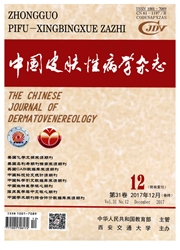

 中文摘要:
中文摘要:
目的探讨亚毒性剂量的中波紫外线(UVB)照射和过表达p53对人皮肤成纤维细胞(HSF)在光致癌相关基因表达的影响。方法以反复多次的亚毒性剂量UVB照射正常HSF细胞株和已构建成功的p53稳定过表达HSF细胞株,定制实时定量PCR芯片,检测光致癌发生相关基因的表达。结果UVB照射和过表达p53在促进衰老基因表达方面,UVB照射的作用更为显著;过表达p53使抑凋亡基因bcl-2下调,促凋亡基因bax上调,UVB照射则可加强过表达p53的诱导凋亡作用;过表达p53可下调癌基因HIF-1α,VEGF和hdm2的表达,UVB照射可促进p53的肿瘤抑制作用。结论过表达p53可使p53依赖的细胞凋亡和抑制肿瘤作用明显增强,亚毒性剂量的UVB还可加强这种作用,从而有助于抑制皮肤肿瘤发生。在UVB作用下,过表达p53可能更倾向于诱导凋亡,而非衰老。
 英文摘要:
英文摘要:
Objective To explore the effect of overexpression of p53 and repeated subcytotoxic UVB radiation on genes expression about photocarcinogenesis in human skin fibroblasts (HSFs). Methods HSFs and transfected wtp53 gene HSF-p53 cells were treated with repeated subcytotoxic UVB radiation. A real time PCR array was performed to investigate mRNA level of genes involved in photocarcinogenesis. Results Repeated snbcytotoxic UVB exposures induced genes expression involved in senescence prior to overexpression of p53. Transfected HSF-p53 cells showed downregulation of bcl-2, up-regulation of bax, downregulation of HIF-1α,VEGF and hdm2. Overexpression of p53 enhanced apoptosis and tumor repression activity and UVB radiation could even promoted them. Conclusion Overexpression of p53 can enhance p53-related apoptosis and tumor repression activity with a tumorigenesis repression function, and repeated suhcytotoxic UVB exposures can promote it. Overexpression of p53 may prefer to induce apotosis but not senescence under UVB radiation.
 同期刊论文项目
同期刊论文项目
 同项目期刊论文
同项目期刊论文
 Nicotinamide attenuates aquaporin 3 overexpression induced by retinoic acid through inhibition of EG
Nicotinamide attenuates aquaporin 3 overexpression induced by retinoic acid through inhibition of EG Extracellular matrix secreted by senescent fibroblasts induced by UVB promotes cell proliferation in
Extracellular matrix secreted by senescent fibroblasts induced by UVB promotes cell proliferation in Quercetin attenuates UV- and H2O2-induced decrease of collagen type I in cultured human lens epithel
Quercetin attenuates UV- and H2O2-induced decrease of collagen type I in cultured human lens epithel p53-related apoptosis resistance and tumor suppression activity in UVB-induced premature senescent h
p53-related apoptosis resistance and tumor suppression activity in UVB-induced premature senescent h 期刊信息
期刊信息
